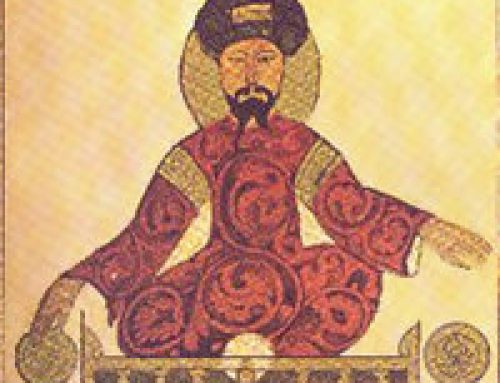The religious faith of Islam, as it was practiced between about 650 and 1500 AD, was closely related to Judaism and Christianity. Like Jews and Christians, Muslims believed that there was only one God, whom they called ‘Allah’. Muslims believed that Moses and Jesus had both existed, and that they were important holy men, and that Mohammed was another in the same line, also holy. Many of the stories in the Quran are retellings of the stories in the Judeo-Christian Bible. After the Islamic Empire was founded, many Muslims lived in the old Sassanian Empire, and a lot of old Zoroastrian beliefs also became common among Muslims.
Muslims believed that if you did things which pleased Allah, you would have a good life on earth, and also a good life after you died. There were five main things Allah liked, which people called the five pillars of Islam:
- Allah wanted you to have no other gods but Allah.
- Allah liked you to pray to him five times a day, facing toward his most holy place at Mecca, in the Arabian peninsula.
- Allah liked you to give charity to the poor.
- Allah liked you to make a trip to Mecca sometime in your lifetime (the Hajj).
- Allah liked you to fast (not eat or drink during the daytime) during Ramadan, the holy month.
Also, Allah totally forbade men or women to eat pork, or drink alcohol, or to make pictures of people. But the most important thing was that a good Muslim should worship only Allah, and no other gods. “There is no god but God,” the Muslims said, “and Mohammed is His prophet.”
A kids’ song with the Muslim prayer in it: “There is no God but God, and Mohammed is his prophet”
Like other world religions after about 500 BC – like Christianity, and medieval Judaism, later Zoroastrianism and Buddhism – Islam generally did not have animal sacrifices, and relied on prayer. The only exception was the Eid al-Adha, the festival at the end of the Haj or trip to Mecca, when people sacrificed a sheep.
By 650 AD, the followers of Islam had already split into two main kinds – most Muslims were Sunnis, but there were also a lot who were Shiites. The Shiites believed that their religious leaders were going to come save them like the Messiah.
Another important part of early Islam was Sufism, which was a belief in a direct relationship between people and God shared by many Sunnis and Shiites.
Learn by doing: visit a mosque
More about the Quran
Bibliography and further reading about Islam:
